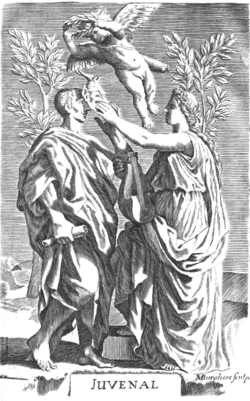Juvenal Quote
Related Quotes
A beautiful woman should always have at the back of her mind that her ravishing appearance is only an ephemeral quality. When she wakes up in the morning, looks into the mirror, and notices that somet...
Michael Bassey Johnson
Tags:
action, advice, ageing, always, appearance, beautiful, beauty, best friend, bride, bride and groom
More often than not, people who are obsessed with their desires and feelings are generally unhappier in life vs. people that refocus their attention on service to others or a righteous cause. Have you...
Shannon L. Alder
Tags:
achievement, altruism, attitude, change, character, charity, choose the right, community, crossroads, desires
About Juvenal
Decimus Junius Juvenalis (Latin: [ˈdɛkɪmʊs ˈjuːniʊs jʊwɛˈnaːlɪs]), known in English as Juvenal ( JOO-vən-əl; c. 55–128), was a Roman poet. He is the author of the Satires, a collection of satirical poems. The details of Juvenal's life are unclear, but references in his works to people from the late first and early second centuries AD suggest that he began writing no earlier than that time. One recent scholar argues that his first book was published in 100 or 101. A reference to a political figure dates his fifth and final surviving book to sometime after 127.
Juvenal wrote at least 16 poems in the verse form dactylic hexameter. These poems cover a range of Roman topics. This follows Lucilius—the originator of the Roman satire genre, and it fits within a poetic tradition that also includes Horace and Persius. The Satires are a vital source for the study of ancient Rome from a number of perspectives, although their comic mode of expression makes it problematic to accept the content as strictly factual. At first glance the Satires could be read as a critique of Rome.
Juvenal wrote at least 16 poems in the verse form dactylic hexameter. These poems cover a range of Roman topics. This follows Lucilius—the originator of the Roman satire genre, and it fits within a poetic tradition that also includes Horace and Persius. The Satires are a vital source for the study of ancient Rome from a number of perspectives, although their comic mode of expression makes it problematic to accept the content as strictly factual. At first glance the Satires could be read as a critique of Rome.
